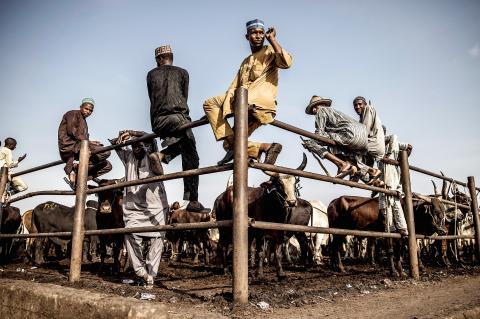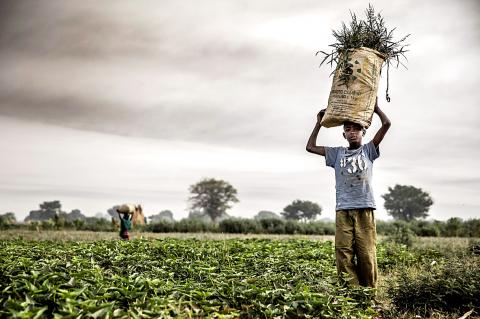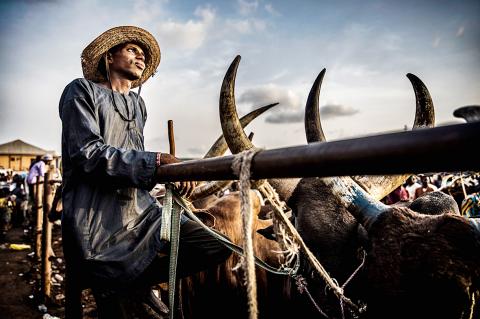Beneath an escalating conflict between herders and farmers in central Nigeria lies a relentless but often under-reported force: history.
Events in the 19th century helped shape today’s violence between mainly Muslim Fulani cattlemen and largely Christian farmers — a battle of blood and identity.
Sokoto, an ancient city in northern Nigeria, is where many Fulani, a semi-nomadic people stretching from Lake Chad to the Atlantic coast, have their spiritual roots.

Phto: AFP
Cross-legged, his eyes closed and palms turned upwards to the heavens, Saidu Bello prays before a huge marble tomb covered in blue velvet: the resting place of Usman Dan Fodio, revered by many as a Muslim saint.
“I pray Allah to give me the same strength as he gave to the Shehu,” says Bello, a 29-year-old trader, referring to Fodio.
“Whenever I have doubts, I come here for his help to make the right decision.”

Phto: AFP
ROOTS OF CONFLICT
In 1804, Fodio, a learned Fulani, declared holy war on despotic leaders.
Urging Muslims to observe a “pure Islam,” he launched an insurrection that, four years later, led to the establishment of the caliphate of Sokoto.

Phto: AFP
The state was as large as it was prosperous, extending from modern-day Burkina Faso to Cameroon — an area that took four months to cross end-to-end. The caliphate ended when its last leader was killed by the British in 1903.
“Usman Dan Fodio united former Hausa kingdoms and brought peace to the whole region,” says Sambo Wali Junaidu, advisor to the current sultan of Sokoto, a direct descendant of the first caliph and Nigeria’s highest-ranking Muslim. “He fought social injustices and undue privileges.”
Fodio’s charisma and writings — treatises and poems written in Arabic, Hausa and the Fula language — inspired Fulani jihads in West Africa throughout the 19th century. And his popularity persists today. At the shrine in Sokoto, pilgrims come from as far as Senegal, laden with offerings. Many of these faithful are barely-literate Fulani herders who have not read any of Fodio’s writings but learned of him through madrassas, or Islamic schools.
The conflict in Nigeria between Fulani and sedentary farmers has erupted in a fertile central region called the Middle Belt.
Demand for water and access to land, driven in part by a surging population in a country of 200 million, are among the contemporary causes for the fighting.
But there is a deeper reason: the Middle Belt lies in Nigeria’s religious faultline, between the predominantly Muslim north and mainly Christian south.
It is also a region that, historically, suffered chronic unrest. Lying on the southern rim of the caliphate of Sokoto, the Middle Belt was largely populated by animist communities.
These were frequently raided by the caliph’s troops to provide slave labour for the plantations, salt mines or burgeoning iron industry which made the empire so prosperous.
Contemporary descriptions by traders are eye-opening. In 1824, in the great commercial hub of Kano, the ratio of the population was 30 slaves to every one free man.
“Native populations, living in this zone of influence during the time of pre-colonial Islamic empires, were psychologically scarred” by the raids and the enslavement, says Alioune Ndiaye, a specialist on Nigeria at the University of Sherbrooke in Quebec, Canada.
Many became Christian as a result, and the traumatic episode resonates in Nigeria today, he says.
“There is still this dread among people in the south that the northerners are coming ‘to dip the Koran in the ocean,’ as the saying goes,” Ndiaye says.
’BLAME THE FULANI’
This backwash of fear and mistrust is often reflected in the Nigerian media, whose main outlets are owned by a southern tycoon.
Fulani herders are routinely called “terrorists,” and a supposed Fulani “plot” to Islamize Nigeria, begun under Fodio, is also media fodder.
Stigmatization worsened after the election in 2015 of President Muhammadu Buhari, a Muslim Fulani from the north. His every decision — from the speed with which he has condemned massacres to the response of the armed forces and the appointments he makes in the army and police — is scrutinized through the lens of ethnic bias, says Ndiaye.
Ibrahim Abdullahi, who represents an association of herders in the northern city of Kaduna, says the notion of a modern-day “Fulani jihad” is a “pure fantasy” that was being manipulated for political ends.
Unlike Mali and Burkina, where jihadist groups exploit ethnic resentment to recruit among Fulani people, the Fulani in Nigeria generally have no claims based on religious ideology.
“Most of the Fulani pastoralists are poor and haven’t been to school. They don’t have a voice, there’s no organization or political elite speaking on behalf of all of them,” he said. “That’s why each time something goes wrong in Nigeria, people blame the Fulani.”

On April 26, The Lancet published a letter from two doctors at Taichung-based China Medical University Hospital (CMUH) warning that “Taiwan’s Health Care System is on the Brink of Collapse.” The authors said that “Years of policy inaction and mismanagement of resources have led to the National Health Insurance system operating under unsustainable conditions.” The pushback was immediate. Errors in the paper were quickly identified and publicized, to discredit the authors (the hospital apologized). CNA reported that CMUH said the letter described Taiwan in 2021 as having 62 nurses per 10,000 people, when the correct number was 78 nurses per 10,000

As we live longer, our risk of cognitive impairment is increasing. How can we delay the onset of symptoms? Do we have to give up every indulgence or can small changes make a difference? We asked neurologists for tips on how to keep our brains healthy for life. TAKE CARE OF YOUR HEALTH “All of the sensible things that apply to bodily health apply to brain health,” says Suzanne O’Sullivan, a consultant in neurology at the National Hospital for Neurology and Neurosurgery in London, and the author of The Age of Diagnosis. “When you’re 20, you can get away with absolute

May 5 to May 11 What started out as friction between Taiwanese students at Taichung First High School and a Japanese head cook escalated dramatically over the first two weeks of May 1927. It began on April 30 when the cook’s wife knew that lotus starch used in that night’s dinner had rat feces in it, but failed to inform staff until the meal was already prepared. The students believed that her silence was intentional, and filed a complaint. The school’s Japanese administrators sided with the cook’s family, dismissing the students as troublemakers and clamping down on their freedoms — with

As Donald Trump’s executive order in March led to the shuttering of Voice of America (VOA) — the global broadcaster whose roots date back to the fight against Nazi propaganda — he quickly attracted support from figures not used to aligning themselves with any US administration. Trump had ordered the US Agency for Global Media, the federal agency that funds VOA and other groups promoting independent journalism overseas, to be “eliminated to the maximum extent consistent with applicable law.” The decision suddenly halted programming in 49 languages to more than 425 million people. In Moscow, Margarita Simonyan, the hardline editor-in-chief of the